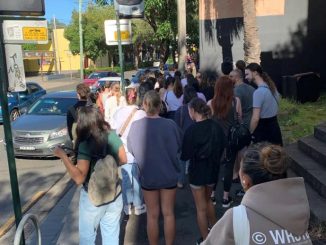
When Evelyn arrived in Sydney in early 2023 to begin her master’s degree, she dreamed of academic progress, broadening her horizons and achieving her dreams. But reality quickly shattered her expectations within a matter of months. She soon discovered that many international students were trapped in an invisible labour system, where legal protections often failed to reach those who needed them most.
‘I didn’t even have a formal interview,’ Evelyn recalled. ‘The manager pulled me into a We Chat group with over 40 people. That’s how I started working. There was no contract, no paperwork, just a weekly schedule that changed every week.’ According to Evelyn’s description, the scheduling was largely determined by the mood of the person in charge, and employees who had a good relationship with the person in charge often got more work opportunities and easier positions.
This is a milk tea shop located in Haymarket, where Evelyn works part-time. She earns only 12 Australian dollars per hour in cash, far below the Australian legal minimum hourly wage of 24.10 Australian dollars for temporary workers. When she questioned the low pay, the manager simply replied, “Everyone else does it.”
Evelyn’s story is not unique. According to a national survey “International Students and Wage Theft in Australia” by the ‘Migrant Worker Justice Initiative,’ 77% of international students earn less than the minimum wage for casual workers, and 26% earn 12 Australian dollars or less per hour. Notably, the report indicates that Chinese students are particularly vulnerable within the international student population.The report states that over half (54%) of Chinese international students earn less than 12 Australian dollars per hour, with nearly one in ten earning less than 10 Australian dollars.
Language barriers exacerbate the issue, with 68% of students with good English skills being paid below the legal wage, and those with average or poor English skills facing even greater challenges.
A system built on fragility
Evelyn worked at this milk tea shop for three months. ‘I really didn’t dare to quit that time,’ she admitted. ‘I needed money to pay rent and buy food. If I said the wrong thing, I might never get another shift.’
After leaving the milk tea shop, Evelyn tried working at a barbecue restaurant. “They made me work for free for three days. I worked from morning till night, but when I quit, they didn’t pay me a penny.”
Worse still, she witnessed the store manager sexually harassing female employees. “He would say, ‘You girls can dress up more when you come to work,’ and he would deliberately touch the women. We all felt uncomfortable, but no one dared to speak up.” This was also the reason why Evelyn eventually decided to quit.
Behind the silence lies fear
Why didn’t anyone report it? Because too many people were afraid. According to a survey, only 3% of international students who were owed wages took any action to assert their rights. The main reasons most people chose to remain silent included: fear of losing their job (48%), fear of visa issues (38%), and believing that complaining wouldn’t make a difference (37%).
Evelyn deeply understands this. ‘I was afraid of losing my job and affecting my visa. I was even more afraid of being seen as a troublemaker.’ Evelyn’s thoughts reflect those of most international students, who believe that finding a job is already difficult enough, so a lower salary is acceptable as long as they have something.
Beyond those who are unwilling to advocate for themselves, many students are also deeply misinformed. 62% of international students mistakenly believe that accepting low wages is illegal, and 51% believe that receiving cash wages is illegal. ‘I’m afraid that if I report it, the relevant authorities will label me as an accomplice,’ Evelyn said.
No place to turn, no one to help
Although the Australian Fair Work Ombudsman provides multilingual resources, most students have no idea how to use them. Among students facing work-related issues, only one in ten has sought help from government agencies, with most resorting to social media or online forums.
‘There’s no complaint channel on We Chat,’ Evelyn said with a wry smile, ‘and there’s no one you can really rely on.’
Even on campus, the situation is bleak. Only 5% of students have sought help from campus staff or student organizations. While many schools offer legal aid services, students either don’t know about them, can’t find them, or are too afraid to go.
The Path to Change
The good news is that some universities have already taken action. Some admission brochures now include information on labour rights, student organizations have begun translating and disseminating rights guides, and the Redfern Legal Centre has launched an anonymous and free legal assistance service.
But Evelyn believes that the first step is education. ‘We need to know that we have rights, and that these rights are greater than we imagine, and that defending our legitimate interests is not difficult.’
Today, Evelyn works part-time at a chain supermarket, where her wages are legal and her benefits are fair, but those memories still linger.
“Now, whenever someone says, ‘Come try working for a few days,’ I hesitate,” she says. “I always worry I’ll be taken advantage of again.”
Her message to other international students is simple: “Know your rights. If you can, speak up. Don’t let anyone treat you like you’re disposable.”




Be the first to comment